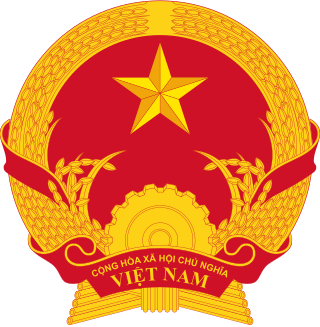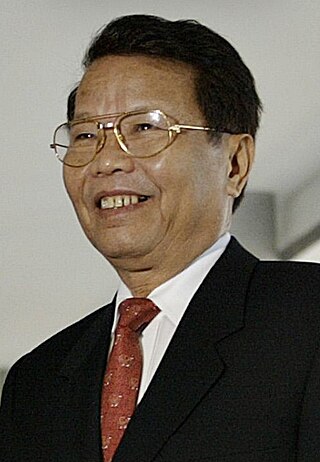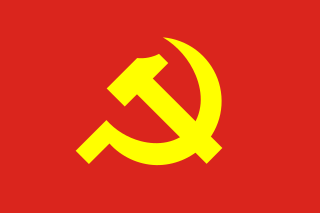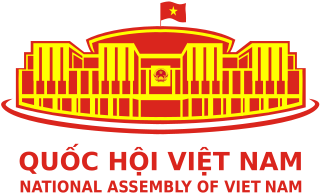
The politics of Vietnam is dominated by a single party under an authoritarian system, the Communist Party of Vietnam (CPV). The President of Vietnam is the head of state, and the Prime Minister of Vietnam is the head of government. Both of these offices are separate from the General Secretary of the Communist Party of Vietnam, who leads the CPV and is head of the Politburo and the Central Military Commission. The General Secretary is thus the de facto highest position in the Vietnamese politics.

Trần Đức Lương is a Vietnamese politician who served as the sixth President of Vietnam from 1997 to 2006.

The president of the Socialist Republic of Vietnam is the head of state of Vietnam, elected by the National Assembly of Vietnam from its delegates. Since Vietnam is a one-party state, candidates for the post are nominated by the Central Committee of the Communist Party of Vietnam. The officeholder is generally considered to hold the second-highest position in the political system, practically after the general secretary of the Communist Party of Vietnam. As head of state, the President represents Vietnam both domestically and internationally, and maintains the regular and coordinated operation and stability of the national government and safeguards the independence and territorial integrity of the country.

The National Assembly of the Socialist Republic of Vietnam is the unicameral parliament and the highest body of state power of Vietnam. The National Assembly is the only branch of government in Vietnam and, in accordance with the principle of unified power, all state organs are subservient to it.

The 10th National Congress of the Communist Party of Vietnam was held in Ba Đình Hall, Hanoi from 18 to 25 April 2006. The congress occurs every five years. 1,176 delegates represented the party's 3 million members. At the 13th plenum of the Central Committee, held before the congress, it was decided that eight members of the Communist Party's 9th Politburo had to retire. While certain segments within and outside the Politburo were skeptical, the decision was implemented. Because of party rules, the congress was not empowered to elect the general secretary, and it held a survey on whom the delegates wanted to be appointed General Secretary. The first plenum of the Central Committee, held in the immediate aftermath of the congress, re-elected Nông Đức Mạnh as general secretary.

Nguyễn Minh Triết is a Vietnamese politician who served as the seventh President of Vietnam from 2006 to 2011. He was elected by the National Assembly of Vietnam with 464 votes (94%) in June 2006.

The general secretary of theCommunist Party of VietnamCentral Committee, simply and informally the general secretary, is the current title for the holder of the highest office within the Communist Party of Vietnam (CPV), being in practice the highest position in the politics of Vietnam. The general secretaryship used to be the second-highest office within the party when Hồ Chí Minh was the chairman, a post which existed from 1951 to 1969, and since 1969, the general secretary has generally been regarded as the highest leader of Vietnam. The general secretary also holds the title of secretary of the Central Military Commission, the leading party organ on military affairs. The current general secretary is Tô Lâm, ranking first in the Politburo. The position was once designated the first secretary from 1951 to 1976.

The Chairman of the National Assembly of Vietnam is the legislative speaker of the Socialist Republic of Vietnam, presiding over the National Assembly. The National Assembly is, in the words of the constitution, "the highest representative organ of the people; the highest organ of state power". This position was formerly designated as the Chairman of the Standing Committee of the National Assembly of Vietnam from 1946 to 1981.

The Political Bureau (Politburo) of the Communist Party of Vietnam Central Committee is the highest body of the Communist Party of Vietnam (CPV) in between gatherings of the National Congress and of the plenary sessions Central Committee. According to Party rules, the Politburo directs the general orientation of the government, and by that, it has dominant power in the politics of Vietnam.

Parliamentary elections were held in Vietnam on 20 July 1997. The Communist Party of Vietnam (CPV) was the only party to contest the election, although independent candidates were also allowed to run, but must be affiliated with the Vietnamese Fatherland Front (VFF), an umbrella organization that is also under the control of the CPV. The VFF won 447 of the 450 seats, of which the CPV won 382. Voter turnout was reported to be 99.6%.
The 4th Politburo of the Communist Party of Vietnam (CPV), formally the 4th Political Bureau of the Central Committee of the Communist Party of Vietnam (Vietnamese: Bộ Chính trị Ban Chấp hành trung ương Đảng Cộng sản Việt Nam Khoá IV), was elected at the 1st Plenary Session of the 4th Central Committee in the immediate aftermath of the 4th National Congress.
The 9th Politburo of the Communist Party of Vietnam (CPV), formally the 9th Political Bureau of the Central Committee of the Communist Party of Vietnam (Vietnamese: Bộ Chính trị Ban Chấp hành trung ương Đảng Cộng sản Việt Nam Khoá IX), was elected at the 1st Plenary Session of the 9th Central Committee in the immediate aftermath of the 9th National Congress.
The 8th Politburo of the Communist Party of Vietnam (CPV), formally the 8th Political Bureau of the Central Committee of the Communist Party of Vietnam (Vietnamese: Bộ Chính trị Ban Chấp hành trung ương Đảng Cộng sản Việt Nam Khoá VIII), was elected at the 1st Plenary Session of the 8th Central Committee in the immediate aftermath of the 8th National Congress.

The 13th Politburo of the Communist Party of Vietnam (CPV), formally the 13th Political Bureau of the Central Committee of the Communist Party of Vietnam (Vietnamese: Bộ Chính trị Ban Chấp hành trung ương Đảng Cộng sản Việt Nam Khoá XIII), was elected at the 1st Plenary Session of the 13th Central Committee (CC) in the immediate aftermath of the 13th National Congress. Nguyễn Phú Trọng was re-elected for his third term as General Secretary of the Communist Party of Vietnam, a position he has held since 2011.

The 15th National Assembly of Vietnam is a parliamentary cycle that commenced in July 2021 following the legislative elections on 23 May 2021. The National Assembly has 499 members, formally confirmed at the 8th meeting of the National Election Council on 12 July 2021.

The 8th Central Committee of the Communist Party of Vietnam (CPV) was elected at the 8th CPV National Congress. It elected the 8th Politburo and the 8th Secretariat.

The 4th Central Committee of the Communist Party of Vietnam (CPV) was elected at the 4th CPV National Congress. It elected the 4th Politburo and the 4th Secretariat.

The 2nd Central Committee of the Workers' Party of Vietnam (WPV) was elected at the 2nd WPV National Congress. It elected the 2nd Politburo and the 2nd Secretariat.
The 8th Politburo Standing Committee of the Communist Party of Vietnam (CPV), formally the 8th Standing Committee of the Political Bureau of the Central Committee of the Communist Party of Vietnam (Vietnamese: Thường vụ Bộ Chính trị Ban Chấp hành Trung ương Đảng Cộng sản Việt Nam Khoá VIII), was elected at the 1st Plenary Session of the 8th Central Committee in the immediate aftermath of the 8th National Congress.












